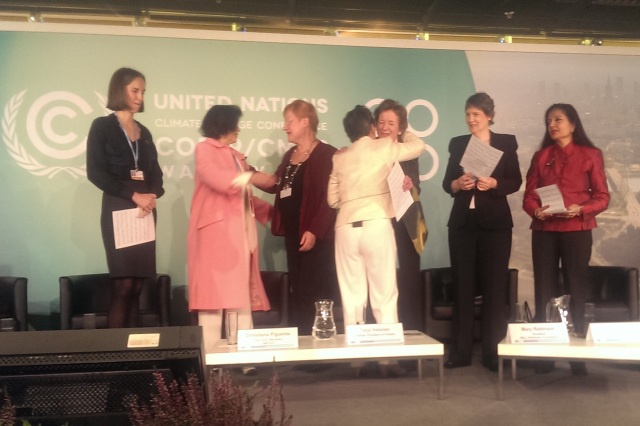Mary Robinson took part in a panel discussion on gender and climate change at the UNFCCC event Gender: Vision 50/50, which took place as part of events to mark Gender Day (November 19) at COP19.
Mary Robinson took part in a panel discussion on gender and climate change at the UNFCCC event Gender: Vision 50/50, which took place as part of events to mark Gender Day (November 19) at COP19.
At the event Mrs Robinson discussed how transformational leadership was required to for a truly equitable climate agreement.
Fellow panellists included Lakshmi Puri, Deputy Executive Director, UN Women; Ms Helen Clark, Administrator, UNDP; Bianca Jagger, Chair of the Bianca Jagger Human Rights Foundation; and Ms Tarja Halonen, former President of Finland. The panel was moderated by Christiana Figueres, Executive Secretary of the UNFCC, while Riley McAuliffe, an Australian youth delegate at COP19 with youth climate group Global Voices, accepted the invitation for an audience member to join the panel.
Panellists made reference to Gender Decision23/CP18, enacted in Doha in 2012. The Decision refers to “Promoting gender balance and improving the participation of women in UNFCCC negotiations and in the representation of Parties in bodies established pursuant to the Convention or the Kyoto Protocol.”
Helen Clark commended the Decision as a “paradigm in gender equality”, and, in reference to women, added: “No decision is about us without us.” Lakshmi Puri also spoke of how women can be a force multiplier for sustainable development and tackling climate change.
In discussing the important role women can have in addressing climate change, Mrs Robinson cited two priority pathways to achieving climate justice, as outlined in the Declaration on Climate Justice:
- Giving Voice: We can only succeed in tackling climate change if we give voice to those most affected, listen to their solutions, and empower them to act.
- A New Way to Grow: There is a limit to the carbon the world emits if it wants to avoid a world of even fiercer weather shocks than now. We need to move to a low carbon economy, and leave remaining fossil fuel reserves in the ground.
Elizabeth Njoroge, Executive Director of the Art of Music, concluded the session by singing an original song, ‘Vision 50/50’, that was written, composed and first performed for this event.
Related Links
Our Work: Women’s Leadership on Gender and Climate Change


